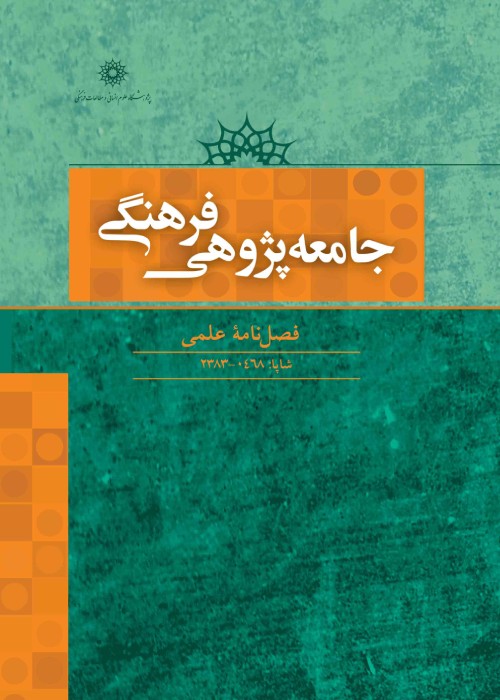Heidegger's pathos and fundamental attunementTowards a moodiness’ and concernful education
In this article, we examine the concepts of attunement and fundamental attunement in relation to Aristotelian pathos, and in this way, we are guided to a positive and moodiness’ education. Therefore, we examine the concept of pathos and with Heidegger's interpretation of pathos, we arrive at action affected and at the same time active, which draws the fundamental existenzial attunement in which behavior-action is raised in the projective context by being influenced by things, people and the surrounding world. With this consideration, basic feelings and attunement are presented as basic things that cause awakening and moving towards another possibility of Being. Therefore, according to Heidegger's teachings, moodiness’ education , by considering of fundamental attunement as essential, understands education in the context of worldhood, relation to things and others and yes-saying to possibilities which makes possible a better understanding then causes openness to Being and numerous possibilities of moodiness’ education.
According to Heidegger, attunement (Befindlichkeit) and fundamental attunement (Grundstimmung) are fundamental existenzials that show the effect and influence of Dasein. Therefore, Heidegger intends to understand feelings and passivities in a fundamental way, because "the fundamental ontological interpretation of affect since the time of Aristotle has not been it has not taken a remarkable step forward. On the contrary, impressions and feelings are classified under sensual phenomena in terms of subject and play a role in the third level and often along with imagination and will. In this way, they descend to the category of secondary phenomena" (Heidegger, 1389: 186).
The aim is to study of dimensions and meanings of Heidegger's fundamental attunement and therefore the basis of the moodiness’ education plan with descriptive and phenomenological methods. Now, in order to thematization, it is necessary to reveal the effects in all its aspects. Heidegger does not neglect the ontic side of the influences, firstly, the starting point of the ontological analysis, in turn, is based on the ontic matter, and he leaves the attribution with the existing and ontic reality to the ontological foundations. Secondly Heidegger, as a phenomenologist, starts from the phenomenon that first and foremost reveals it in its daily life. Therefore, "at the beginning of our analysis, we should not interpret Dasein in a way that differentiates it from certain existence, but we should discover it in its non-differentiation that appears in the first place and often. It is not that this difference of everydayness (Alltäglichkeit) is nothing, but it is the characteristic of positive phenomena" (Heidegger, 1389: 59-60) and thirdly, that we should deal with feelings and impressions from the place where metaphysical overcoming systematically started from there overcoming which has pushed back every day and ontic feelings and emotions then has caused the blocking of the ontological aspect from the beginning.
Education is affected by various matters, but when we base education on the ultimate goals or pre-formed nature such as subject-oriented or ontology, the factors that are effective are practically ignored. Metaphysical issues determine education on a certain basis and put any influencing matter outside of the system and necessarily consider life under a particular state as final. This causes the opening to existence to be blocked and something like education towards the ultimate goals and specific nature becomes meaningful. Here, first of all, the ontology of education should be mentioned in order to understand ontic education based on ontology. Such an encounter requires the destruction of metaphysical thinking in order to open up a possibility. Heidegger's thinking, according to his understanding of ontology and returning it to the fundamental question of existence, is a thinking that can create factors in the educational system so that the possibilities that cannot be seen and heard become visible and audible. For this purpose, Heidegger first makes affectability fundamental and then transforms mood and attunement from an ontic state into existential and fundamental things, so that another possibility of Being is opened from its beginning.
According to Heidegger's teachings, the movement from Aristotelian pathos to attunement and fundamental attunement causes the release of hidden dimension that are effective in education. Such an encounter causes the influence of things and others to be understood in basic education, and at the same time, the concept of action in the sense of affected action (projected thrownness) is possible and prepared. This is alien to the concept of a free, unworldly and unmoodness subject. Attitude education means education that is formed in relation to moods, feelings and the environmental world. This kind of education is essentially based on Being because the basic influences and fundamental attunement, as the subjective thinking, are not supposed to beat the trainee-mentor with certain and unshakable truths, but rather it is supposed to allow the trainee and the trainer to express themselves in their own way and based on their existence and moods. By being open to their history, tradition and history, moodiness’ teachers and trainers have also opened to new (ontic) knowledge. In addition, moodiness’ education is a thoughtful education because he understands its reality and is a planner in being affected and thrown. A moodiness’ thinking about what it has, what it is, and what is coming to it, and it understands deep boredom and anxiety as a condition that makes another beginning possible, which pulls us from the heart of our lived life to another projection.
- حق عضویت دریافتی صرف حمایت از نشریات عضو و نگهداری، تکمیل و توسعه مگیران میشود.
- پرداخت حق اشتراک و دانلود مقالات اجازه بازنشر آن در سایر رسانههای چاپی و دیجیتال را به کاربر نمیدهد.


